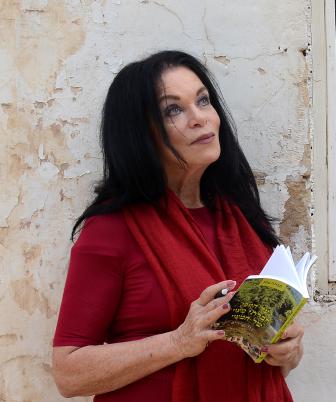Sabina Messeg

Sabina Messeg
The founder of Israeli eco-poetry and the author of nine volumes of verse and more than a dozen children’s books, Messeg is a descendant of Jews expelled from Spain in 1492. She was born in Bulgaria and, after statehood was declared, emigrated to Israel as a child with her parents, to Jaffa. As may be seen from the titles of her books, the poet has become more than acclimated to the rural areas where she has often chosen to live and which provide most of her imagery. She is the recipient of the Prime Minister's and the Lea Goldberg prizes for poetry, and the Ze'ev Prize for children's literature.
Messeg's family – a Bulgarian mother and Greek father – was highly educated and imbued with European culture; the parents spoke French between them and felt lost among the new immigrants who populated Jaffa at the time. Messeg's father had a rubber factory back in Sofia, and had planned to build a similar factory here, but his money was lost on the way and he was forced to work as a construction worker.
Her mother, she recalls, was a beautiful woman - blond, gentle and intelligent. She gave private lessons in French at first, and when that didn't bring in enough money, she went to work as a seamstress. She also did not integrate well in Jaffa. "I always dreamed of writing and of earning a lot of money so I could save her", says Messeg.
The poet learned how to do two things: to be alone and to write.
[Complete profile in LINKS below.]
bone-white
boulders
heaped into fences
clumps
of earth
plowed to allow wheat
pines
pinned-down
to delineate the map
of my
being
here
upon firm earth
under unstable skies
and the olives —
ripening patiently beneath
the silver
leaves
in sun
in rain
in front of my eyes –
the oil
that might anoint
a king
but lets me
dip
in
it
black bread
white onion causing
tears [From Klil, Tr. Sabina Messeg]
The poet, the mother of three grown children with her husband, the artist Aharon Messeg (1942-2018), divides her time between the rural community of Klil in the Galilee in northern Israel and Tel Aviv.
BOOKS in Hebrew
POETRY
Voices of Flight/Kolot Mashak, Jerusalem, Tcherikover (Magnes), 1984
Magdala/Ha-Bayit Be-Migdal, Tel Aviv, Hakibbutz Hameuchad, 1987
Moshav, Tel Aviv, Hakibbutz Hameuchad, 1991
Monastery Days/Yemei Minzar, Tel Aviv, Schocken, 1997
This Sea of Galilee/Ve-Ha-Yam Ha-Ze, Yam Kinneret, Tel Aviv, Hakibbutz Hameuchad, 1998
Klil [with Aharon Messeg], Ra’anana, Even Hoshen, 2003
Elite Monogamy/Monogamya Ilit, Tel Aviv, Hakibbutz Hameuchad, 2009
Straight From the Outdoors: Selected Poems/Yashar Min Ha-Shetach: Mivcher Shirim, Tel Aviv & Jerusalem, Hakibbutz Hameuchad, Bialik Institute, 2014
The Extraordinary Beauty of the Ordinary: Nano Poems/Al Ha-Yofi Ha-Bilti Matzuy Shel Ha-Matzuy: Nano Shirim, Jerusalem, Poetry Place, 2017
All books listed in Hebrew
Ohio State University
Wikipedia
LINKS
Poems in Translation
In English
Elementary Facts and The Age of Claypots
Mediterranean Poetry
In Latvian, Vietnamese, Spanish, French, and English
Lyrikline
An interview in English
Haaretz
In Hebrew
A recent interview
Ma'ariv
A review
Monastery Days
Sponsors
























